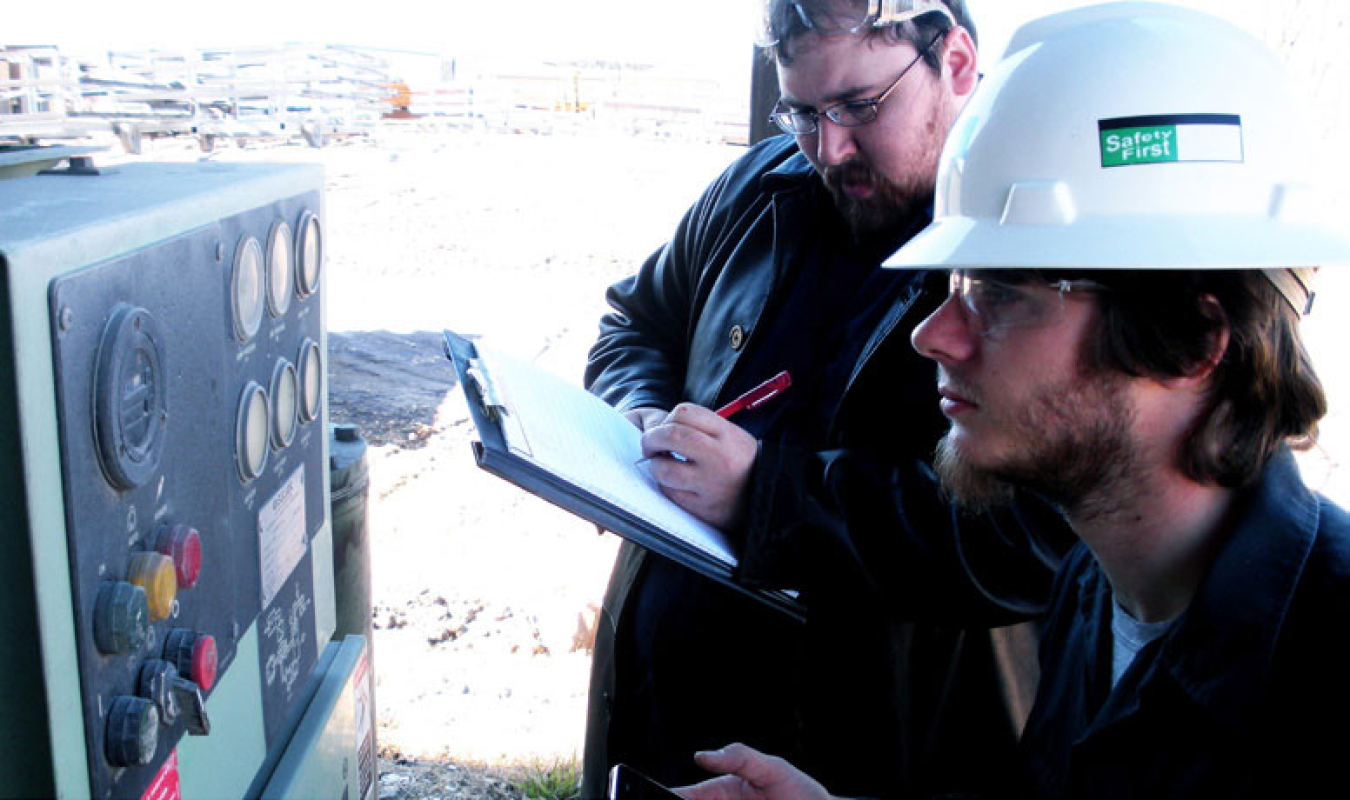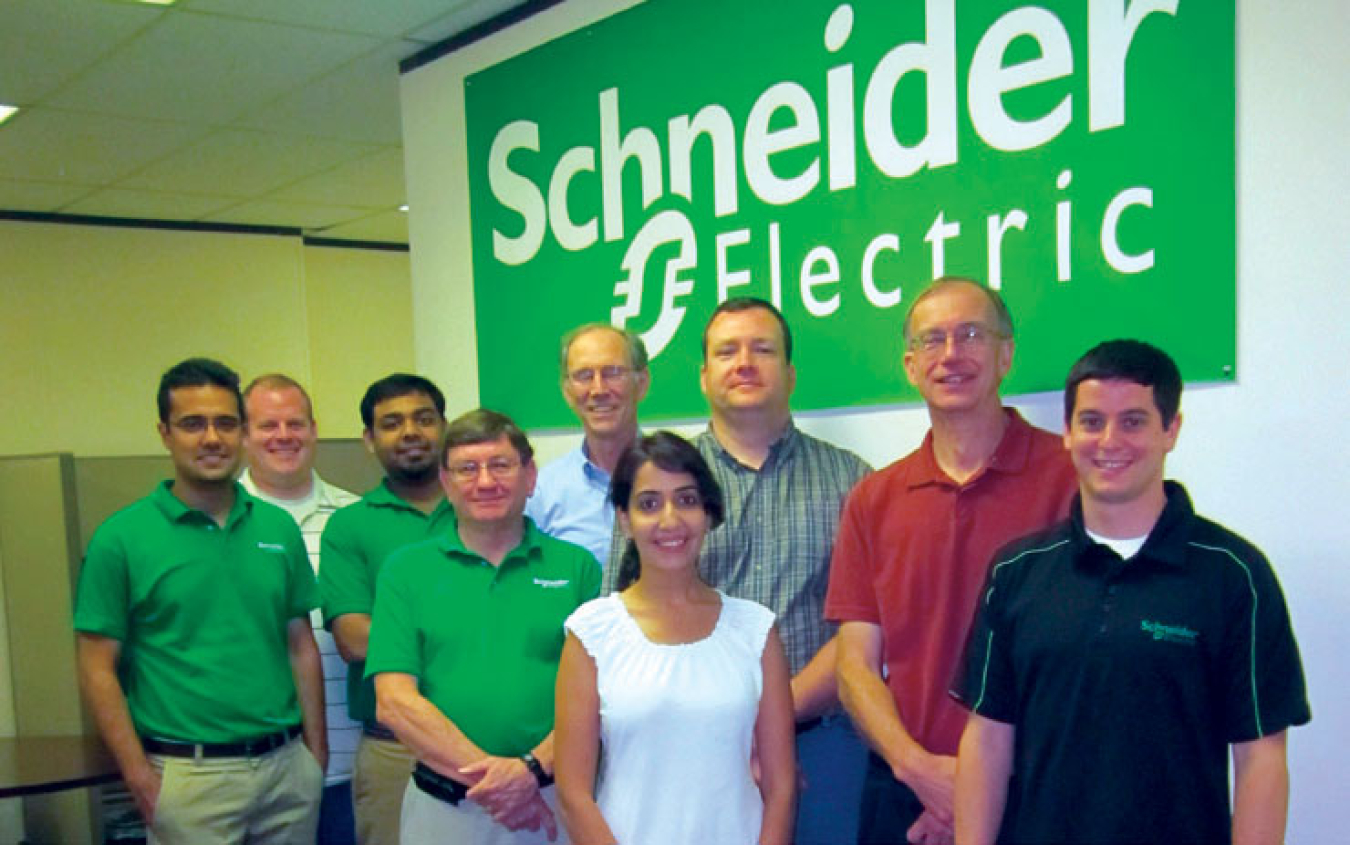
<em>Courtesy of Kelly Guiberteau</em>

Schneider Electric operates six R&D facilities; six distribution centers; 40 manufacturing facilities; and several hundred sales, service, and business centers across the United States.<br /><em>Courtesy of Schneider Electric</em>

Members of the TEC team (from left to right): Aman Khippal, Wade Willatt, Anoop Alex, Walter Hendrix, Joseph Dorey, Bimaldeep Kaur, Jacob Freeman, Carl Castellow, and Matan Marom.<br /><em>Courtesy of Schneider Electric</em>
Carl Castellow realized that his industrial consulting team at Schneider Electric could benefit from adding staff members with Industrial Assessment Center (IAC) experience. Working together with colleagues and the company’s recruiting center, they initiated a successful recruitment strategy that has brought IAC graduates to the team and added value to the organization. Schneider Electric’s use of IAC graduates emulates one of the primary intended outcomes that the U.S. Department of Energy’s (DOE’s) Advanced Manufacturing Office (AMO) envisioned for the IAC program.
Today’s job market is crowded and competitive with more than 1.5 million people exiting undergraduate programs and more than 600,000 graduates completing master’s degrees annually in the United States. Distinguishing one’s self in a sea of new graduates can be a major advantage for any job seeker. Fortunately for IAC graduates, their unique skills and experiences attract the attention of prospective employers. IAC graduates have participated in a unique training program designed to provide them with real-world engineering experience in the field of industrial energy efficiency.
The IAC Advantage
Each year at 24 universities across the country, 250 to 350 undergraduate- and graduate-level engineering students receive training in manufacturing energy efficiency through the IAC program. This program is sponsored by AMO and funded through DOE grants.
By participating in the IAC program, students acquire exceptional training in industrial energy and resource efficiency. They participate in assessments at working industrial facilities and gain experience using specialized diagnostic equipment to conduct energy, waste, and productivity evaluations. IAC students graduate with skills required for work in manufacturing environments and knowledge of industrial processes that can only be gained through real-world experience.
Through the IAC program, teams of engineering students and faculty perform energy assessments for local small- and mid-sized manufacturers at no cost to the companies. Each assessment involves an in-depth examination and analysis of a plant site, including the facilities, equipment, and manufacturing processes. Through this evaluation, the IAC team is able to provide the company with a report detailing savings recommendations that include energy efficiency, productivity, waste minimization, and pollution prevention opportunities.
Schneider Electric Strategy for IAC Graduate Recruitment
Mr. Castellow is one hiring manager that has seen the value that IAC graduates can bring to a company. He is the Director of Industrial Energy Efficiency at Schneider Electric—a global company specializing in energy distribution and management with a portfolio of services in electrical distribution, industrial automation, critical power and cooling, building management, and security. The company employs about 18,000 people throughout the United States at six research and development (R&D) facilities; six distribution centers; 40 manufacturing facilities; and several hundred sales, service, and business centers. Schneider Electric achieved more than $26 billion in global sales in 2010.
About 1,150 employees work at the company’s offices in Raleigh-Durham, North Carolina. This location is the U.S. headquarters for Schneider Electric’s industry business division, which includes R&D, sales, and service operations. Mr. Castellow oversees the Total Energy Control (TEC) team in the Energy Solutions Business Unit. Schneider Electric’s TEC team focuses on energy consulting for industrial clients. The team conducts energy assessments at industrial facilities, makes recommendations for improvements, and provides services to implement recommended projects and make the necessary process improvements for the plants to become more energy efficient. Mr. Castellow’s team is an energy consulting group of 12 people, eight of whom are IAC graduates—this is not a coincidence, however.
In 2008, Bo Hendrix, a member of the TEC team, suggested that the IACs might be a good source of talent for the group. Before coming to Schneider Electric, Mr. Hendrix had been the Director of the IAC (then known as the Energy Analysis and Diagnostic Center) at the Georgia Institute of Technology from 1977 to 1980. Thus, he was familiar with the IAC program and its hands-on training approach to industrial energy efficiency. In response to Mr. Hendrix’s proposal, Mr. Castellow collaborated with the two managers on his team to implement a new hiring strategy for the group—targeting the recruitment of IAC graduates. Consequently, Schneider Electric has come to recognize IAC-experienced staff members as being a valuable asset for the TEC team.
After becoming familiar with the IAC program, Mr. Castellow and his managers began reaching out to graduates by connecting directly with coordinators for the national IAC program; these coordinators were able to pass along the names and contact information for qualified candidates from various centers. Mr. Castellow then engaged Schneider Electric’s recruiting center in the new hiring strategy. Terri Brashear and Megan Anderson—from the company’s talent acquisition and university relations teams, respectively—were instrumental in connecting with additional candidates from the IAC program. As a result of these efforts, in 2008, four IAC alumni accepted positions on the TEC team.
In February 2010, Matan Marom—a member of the TEC team and an IAC graduate—was invited to participate in the annual IAC Student Meeting in Washington, D.C. This event serves as a forum for current IAC students to learn more about the program, share best practices, and network with potential employers. Mr. Marom was a featured speaker at the meeting, and he participated in a career panel discussion. Over the course of the event, he took the opportunity to meet students and collect resumes. Through this interaction, six promising candidates were identified and invited to North Carolina to interview for positions with and learn more about Schneider Electric. Of those interviewed, three were hired to join the TEC team.
IAC Experience Gives New Hires a Leg Up
Schneider Electric seeks to recruit candidates that have conducted industrial energy assessments, a skill set not readily available in recent graduates beyond those that have participated in the IAC program. “Experience is very important to us. The people who we put in front of customers represent the company. So, having people who have been inside industrial plants before and aren’t intimidated by it is important,” Mr. Castellow explains. In addition to time spent inside industrial facilities, IAC graduates can take a complex industrial plan and break it down to analyze energy use. According to Mr. Castellow, “That background is well-developed in students who have taken part in the IAC program.”
However, it is not only technical skills that provide IAC graduates with an advantage over the competition — their proven interest in the energy field sets them apart as well. “With IAC graduates, we’re getting people who have chosen to get involved with energy for a reason,” he says. Mr. Castellow knows that these individuals are not looking for just any engineering job. “These are people who got involved with the IACs because they were interested in the field. So, we feel like it narrows the pool of potential applicants for us. Instead of looking at every graduating engineer, we can look at just a select number who have chosen energy.”
By focusing recruiting efforts on IAC graduates, Mr. Castellow has been able to hire new team members that have a passion for energy efficiency along with substantive work experience performing energy assessments for industrial clients. Without question, the IAC-focused hiring strategy has provided Schneider Electric, and specifically the TEC team, with tangible benefits. Most of the IAC graduates on the TEC team were hired in Application Engineer positions, and several have already been promoted to Senior Application Engineers, providing a clear path to long-term careers at Schneider Electric. The hope is that, as the company continues to emphasize growth in the area of energy solutions, job opportunities will continue to grow in parallel. Consequently, when next year’s IAC students finish their degree programs and graduate, there very well may be employment opportunities for them at Schneider Electric.
Learn More about the IAC Program
Job and internship opportunities can be advertised to IAC students and graduates through the IAC online job board, available at www.iacforum.org.
Please contact Thomas Wenning to find out how your company can connect with IAC graduates: wenningtj@ornl.gov or (865) 241-8676.
<h4>IAC Graduate Workforce Statistics</h4><ul><li><strong>62%</strong> go on to careers with energy or energy efficiency responsibilities</li><li><strong>50%</strong> have productivity improvement responsibilities</li><li><strong>38%</strong> have waste minimization responsibilities</li></ul><h4>Schneider Electric at a Glance</h4><p class="rtecenter">[[{"type":"media","view_mode":"media_large","fid":"823531","attributes":{"alt":"Logo of Schneider Electric","class":"media-image caption","height":"95","style":"width: 166px; height: 50px;","typeof":"foaf:Image","width":"318"}}]]</p><ul><li>Founded in <strong>1871</strong></li><li><strong>$26 billion</strong> in global sales in 2010</li><li><strong>18,000 employees</strong> in the United States</li><li><strong>8 IAC alumni</strong> hired since 2008</li></ul><h4>A Strong Energy Portfolio for a Strong America</h4><p>Energy efficiency and clean, renewable energy will mean a stronger economy, a cleaner environment, and greater energy independence for America. Working with a wide array of state, community, industry, and university partners, the U.S. Department of Energy’s Office of Energy Efficiency and Renewable Energy (EERE) invests in a diverse portfolio of energy technologies. The Advanced Manufacturing Office (AMO) is part of EERE. AMO is the lead government program working to increase the energy efficiency of U.S. industry.</p><p> </p><h4>About the IAC Program</h4><p>A program area of AMO, the Industrial Assessment Centers (IACs) provide eligible small- and medium-sized manufacturers with no-cost energy assessments. Additionally, the IACs serve as a training ground for the next generation of energy-savvy engineers.</p><p> </p><h4>Additional Information</h4><p><a href="http://www.iacforum.org">IAC student forum website</a></p><p> </p><p><em>Originally printed: October 2011</em></p>

